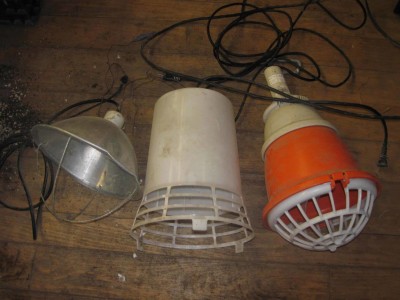Safety for Supplementing Heat to Livestock
Amy Barkley, Team Leader & Livestock Specialist
Southwest New York Dairy, Livestock and Field Crops Program

Safety for Supplementing Heat to Livestock
When it becomes necessary to provide supplemental heat to livestock, management of the barn and heat sources is important to ensure building and livestock safety.
While most livestock can tolerate colder temperatures well, there are times when providing supplemental heat may be necessary to promote their health and welfare. Newborn animals entering the world in the middle of the coldest months is just one example. While there are many ways to supplement heat, mindful steps need to be taken to ensure that those heat sources are both effective and safe.
Heat lamps are one of the most commonly used heat sources due to their low cost and simplicity. However, they are a major cause of barn fires, making design selection crucial for safety. Lamps should have solid ceramic bases, thick, intact cords, and a protective covering around the bulb. The protective covering, which is made of a wire or plastic, keeps the bulb from touching the ground should the heat lamp fall, and reduces the risk of animals potentially breaking the bulb.
Other options for heating include radiant plates, heat pads, and gas heaters, though these should be rated for barn use, firmly affixed to the wall, ceiling, or floor, and kept out of reach of livestock. Portable space heaters are not a good idea, since they can be knocked over by animals. Ideally, heaters should have an automatic shut-off in the case they are tipped.
A few general rules can help promote safe heating. Dust accumulations on any heater should be regularly removed. If possible, heaters should be kept at least two feet away from flammable items such as wood, bedding, fertilizer, pesticides, or cobwebs. Any device should be plugged directly into the wall; using extension cords can increase the risk of fire and malfunctions.
Commercial-sized (5 - 10 pound) fire extinguishers should be kept within easy reach in and around farm buildings. An ABC extinguisher is best, since it can tackle the various fire classes that can start within a barn. The installation of fire alarms, especially in areas where supplemental heat is used, can provide an advance notice of a fire. This can result in quicker response times, saving a barn or livestock. Having an emergency plan in place in the case of a fire including a list of contacts and evacuation plan is advantageous should an adverse event happen.
Supplemental heat is a tool that can be used to maintain the health and comfort of some newborn animals such as chicks, piglets, kids, and lambs; smaller livestock like rabbits, which may be more sensitive to cold; and individuals in poor health which cannot make enough of their own body heat. While heating a livestock area can present risks, they can be mitigated by following the considerations above.
If you are interested in learning more about heating barns or heater safety, contact Livestock and Beginning Farm Specialist, Amy Barkley, at 716-640-0844 or amb544@cornell.edu.
Photo Caption: Heat lamps have varying levels of safety. In this image, the most expensive, safest style is on the right, and the cheapest, riskiest style is on the left. Photo by Michael Glos of Kingbird Farm. This photo was originally shared by the Cornell Small Farms Program.
Upcoming Events
Boots in the Barn: Cornell Dairy Research Updates
January 13, 2026
January 20, 2026
January 27, 2026
February 3, 2026
February 10, 2026
February 17, 2026
February 24, 2026
Join us for some or all!
Deerworm and Flukes in Small Ruminants Webinar
February 25, 2026 : Deerworm and Flukes in Small Ruminants Webinar
Dr. Mary Smith from Cornell's College of Veterinary Medicine and Dr. Rachel White from UMaine Cooperative Extension will be discussing the lifecycles, signs, prevention, and management of deerworm and liver flukes in small ruminants.
NYSDEC How to Get Certified Course
March 3, 2026 : NYSDEC How to Get Certified Course
Ellicottville, NY
NYSDEC training course in preparation to take the pesticide applicator exam.
Announcements
Cows, Crops & Critters Newsletter Sponsorship
TRYING TO REACH GROWERS AND AGRIBUSINESSES IN OUR SOUTHWEST REGION OF NEW YORK?Weekly Email Update: Shared with 625+ households who have signed up with our program.
Monthly Paper Mailer: To reach our stakeholders and farmers who lack internet access, we send out a monthly mailer where your company's logo and contact information would be featured with a mailing list of 330+ households.
If you sponsor our weekly and monthly publications you reach approximately 955 households.





